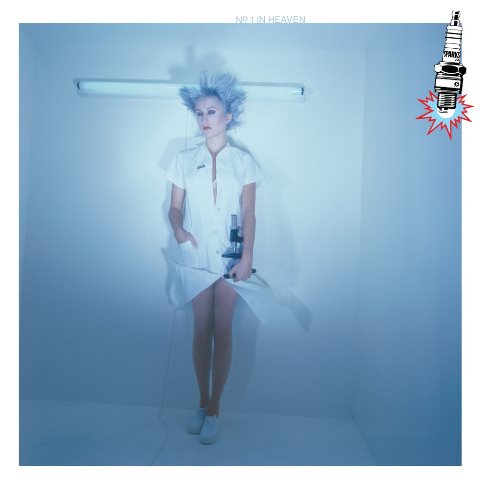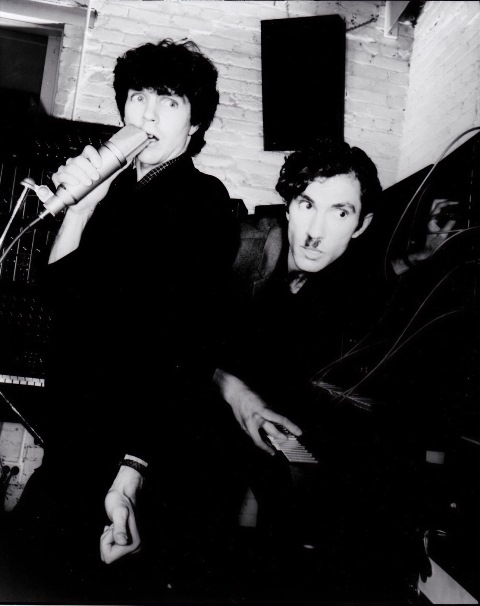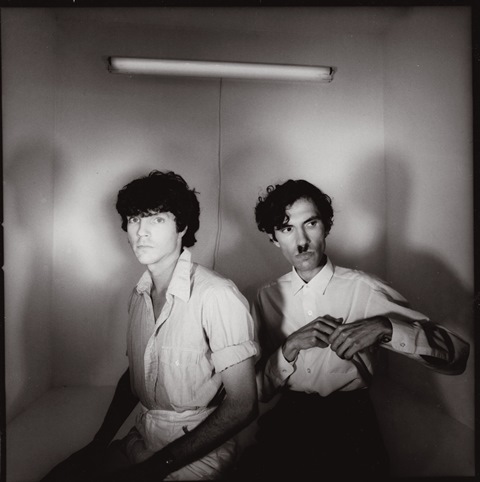Reissue CDs Weekly: Sparks | reviews, news & interviews
Reissue CDs Weekly: Sparks
Reissue CDs Weekly: Sparks
Timelessness, prescience and beauty: 40th-anniversary reappearance of ‘No. 1 In Heaven’

Although American, Sparks’ initial commercial breakthrough was in the UK where their rococo art-rock chimed with ears attuned to, say, Roxy Music. Their sensibility has always been more European than American. In 2009 they issued an album titled The Seduction of Ingmar Bergman. Its theme was a flight of fancy which took the Swedish director to Hollywood.
Another indication of this inclination was their 1979 album No. 1 In Heaven. Newly reissued to mark its 40th anniversary, it began a new phase in Sparks’ career: one initiated by exposure to Donna Summer’s Munich-recorded “I Feel Love”.
 According to Sparks’ Russell Mael, “I Feel Love” had “sent a chill down our collective spine.” In the No. 1 In Heaven reissue's booklet, he goes on to say “those electronics and soulful human voice – what was that?” During a 1978 interview with a German journalist, Sparks had claimed their next album was going to be made with “I Feel Love’s” co-producer and co-writer Giorgio Moroder. No such plans had been made. Their bluff was called when the journalist revealed she knew the producer and put them in touch with him. At this point, Sparks were promoting their unsatisfactory 1977 album Introducing Sparks, where they had smoothed off the edges of their innate quirkiness in an attempt to embrace a classic American sound. No. 1 In Heaven was different. And new.
According to Sparks’ Russell Mael, “I Feel Love” had “sent a chill down our collective spine.” In the No. 1 In Heaven reissue's booklet, he goes on to say “those electronics and soulful human voice – what was that?” During a 1978 interview with a German journalist, Sparks had claimed their next album was going to be made with “I Feel Love’s” co-producer and co-writer Giorgio Moroder. No such plans had been made. Their bluff was called when the journalist revealed she knew the producer and put them in touch with him. At this point, Sparks were promoting their unsatisfactory 1977 album Introducing Sparks, where they had smoothed off the edges of their innate quirkiness in an attempt to embrace a classic American sound. No. 1 In Heaven was different. And new.
After the release of “I Feel Love” in July 1977, a gradual but noticeable shift occurred in how a set of exploratory bands approached their music. The synthesiser was an important shared ingredient, but it was the disco hit’s rhythm and synthetic base which induced change.
 Like Sparks, Japan were smitten, so in 1979 they recorded the “Life in Tokyo” single with Moroder. He co-wrote it with the band’s David Sylvian. Simple Minds’ September 1980 single “I Travel” could not have existed without “I Feel Love”, nor could Roxy Music’s “Angel Eyes” (first heard as an album track in March 1979). On all fronts, Sparks had got there got their already. The Three Degrees aside, they were first pre-existing band to work with Moroder. No. 1 In Heaven was made with Moroder in 1978 and issued in March 1979, a month before “Life in Tokyo” came out.
Like Sparks, Japan were smitten, so in 1979 they recorded the “Life in Tokyo” single with Moroder. He co-wrote it with the band’s David Sylvian. Simple Minds’ September 1980 single “I Travel” could not have existed without “I Feel Love”, nor could Roxy Music’s “Angel Eyes” (first heard as an album track in March 1979). On all fronts, Sparks had got there got their already. The Three Degrees aside, they were first pre-existing band to work with Moroder. No. 1 In Heaven was made with Moroder in 1978 and issued in March 1979, a month before “Life in Tokyo” came out.
After No. 1 In Heaven was completed with Moroder in Los Angeles (in the booklet, it is admitted that despite its original credits it was not recorded at Moroder’s Munich studio), Sparks tried to get labels interested. Russell Mael says “not one enlightened record label immediately wanted to get behind our effort. It didn’t fit in.” Eventually, a Munich-based member of Virgin Records’ staff listened, got it and the album was issued in March 1979, a year after it was completed.
Forty years on, the album is expanded to a two-disc set. The album itself is on Disc One and the second disc collects longer and shorter single versions, the two Peter Cook-voiced promo spots which were on 12-inch 45s and a recently found alternate version of “Tryouts For the Human Race”. The reissue comes on CD and vinyl, but the latter was not supplied for review and is not addressed here.
 Partly, No. 1 In Heaven’s impact is to do with Russell Mael’s ever-distinctive vocals – which always place Sparks outside anything in the moment – but it’s more a consequence of how their music had been reframed. In the booklet, it’s noted that Ron Mael wrote “Beat the Clock” on an acoustic guitar and was aiming for a Velvet Underground feel. In the end, it became soaring and insistently rhythm-bedded. Russell couldn’t contain his longing to yodel the word “clock.” There are also hints of The Man-Machine Kraftwerk of 1978 and suggestions of where New Order arrived in 1982 with “Temptation”. Moroder is by birth Italian and while “La Dolce Vita” has an Italo-disco feel, it points to what would be dubbed Hi-NRG around 1982 and 1983. As it was with working with Moroder, Sparks were looking forward: in this case around four to five years ahead.
Partly, No. 1 In Heaven’s impact is to do with Russell Mael’s ever-distinctive vocals – which always place Sparks outside anything in the moment – but it’s more a consequence of how their music had been reframed. In the booklet, it’s noted that Ron Mael wrote “Beat the Clock” on an acoustic guitar and was aiming for a Velvet Underground feel. In the end, it became soaring and insistently rhythm-bedded. Russell couldn’t contain his longing to yodel the word “clock.” There are also hints of The Man-Machine Kraftwerk of 1978 and suggestions of where New Order arrived in 1982 with “Temptation”. Moroder is by birth Italian and while “La Dolce Vita” has an Italo-disco feel, it points to what would be dubbed Hi-NRG around 1982 and 1983. As it was with working with Moroder, Sparks were looking forward: in this case around four to five years ahead.
Beyond its prescience, No. 1 In Heaven also scores heavily due to its songs. “My Other Voice”, where Russell adopts a slightly lower register than usual, is yearning, otherworldly, mostly instrumental and beautiful. It’s a wonder David Lynch hasn’t co-opted it at some point. “Academy Award Performance” is more manic and sports another instantly unforgettable melody.
The new reissue – on CD at least – has been remastered with a greater dynamic range than the original album. Those already owning No. 1 In Heaven know it’s a terrific album which sounds incredibly fresh and not of its time. Those without a copy are directed to get one, and the 40th-anniverary reissue is as handy a way to do so as any.
- Next week: Refurbished editions of The Residents’ Eskimo and Commercial Album
- Read more reissue reviews on theartsdesk
- Kieron Tyler’s website
Share this article
The future of Arts Journalism
You can stop theartsdesk.com closing!
We urgently need financing to survive. Our fundraising drive has thus far raised £49,000 but we need to reach £100,000 or we will be forced to close. Please contribute here: https://gofund.me/c3f6033d
And if you can forward this information to anyone who might assist, we’d be grateful.

Subscribe to theartsdesk.com
Thank you for continuing to read our work on theartsdesk.com. For unlimited access to every article in its entirety, including our archive of more than 15,000 pieces, we're asking for £5 per month or £40 per year. We feel it's a very good deal, and hope you do too.
To take a subscription now simply click here.
And if you're looking for that extra gift for a friend or family member, why not treat them to a theartsdesk.com gift subscription?
more New music
 'Vicious Delicious' is a tasty, burlesque-rockin' debut from pop hellion Luvcat
Contagious yarns of lust and nightlife adventure from new pop minx
'Vicious Delicious' is a tasty, burlesque-rockin' debut from pop hellion Luvcat
Contagious yarns of lust and nightlife adventure from new pop minx
 Music Reissues Weekly: Hawkwind - Hall of the Mountain Grill
Exhaustive box set dedicated to the album which moved forward from the ‘Space Ritual’ era
Music Reissues Weekly: Hawkwind - Hall of the Mountain Grill
Exhaustive box set dedicated to the album which moved forward from the ‘Space Ritual’ era
 'Everybody Scream': Florence + The Machine's brooding sixth album
Hauntingly beautiful, this is a sombre slow burn, shifting steadily through gradients
'Everybody Scream': Florence + The Machine's brooding sixth album
Hauntingly beautiful, this is a sombre slow burn, shifting steadily through gradients
 Cat Burns finds 'How to Be Human' but maybe not her own sound
A charming and distinctive voice stifled by generic production
Cat Burns finds 'How to Be Human' but maybe not her own sound
A charming and distinctive voice stifled by generic production
 Todd Rundgren, London Palladium review - bold, soul-inclined makeover charms and enthrals
The wizard confirms why he is a true star
Todd Rundgren, London Palladium review - bold, soul-inclined makeover charms and enthrals
The wizard confirms why he is a true star
 It’s back to the beginning for the latest Dylan Bootleg
Eight CDs encompass Dylan’s earliest recordings up to his first major-league concert
It’s back to the beginning for the latest Dylan Bootleg
Eight CDs encompass Dylan’s earliest recordings up to his first major-league concert
 Ireland's Hilary Woods casts a hypnotic spell with 'Night CRIÚ'
The former bassist of the grunge-leaning trio JJ72 embraces the spectral
Ireland's Hilary Woods casts a hypnotic spell with 'Night CRIÚ'
The former bassist of the grunge-leaning trio JJ72 embraces the spectral
 Lily Allen's 'West End Girl' offers a bloody, broken view into the wreckage of her marriage
Singer's return after seven years away from music is autofiction in the brutally raw
Lily Allen's 'West End Girl' offers a bloody, broken view into the wreckage of her marriage
Singer's return after seven years away from music is autofiction in the brutally raw
 Music Reissues Weekly: Joe Meek - A Curious Mind
How the maverick Sixties producer’s preoccupations influenced his creations
Music Reissues Weekly: Joe Meek - A Curious Mind
How the maverick Sixties producer’s preoccupations influenced his creations
 Pop Will Eat Itself, O2 Institute, Birmingham review - Poppies are back on patrol
PWEI hit home turf and blow the place up
Pop Will Eat Itself, O2 Institute, Birmingham review - Poppies are back on patrol
PWEI hit home turf and blow the place up
 'Fevereaten' sees gothic punk-metallers Witch Fever revel in atmospheric paganist raging
Second album from heavy-riffing quartet expands sonically on their debut
'Fevereaten' sees gothic punk-metallers Witch Fever revel in atmospheric paganist raging
Second album from heavy-riffing quartet expands sonically on their debut
 theartsdesk Q&A: Soft Cell
Upon the untimely passing of Dave Ball we revisit our September 2018 Soft Cell interview
theartsdesk Q&A: Soft Cell
Upon the untimely passing of Dave Ball we revisit our September 2018 Soft Cell interview

Add comment